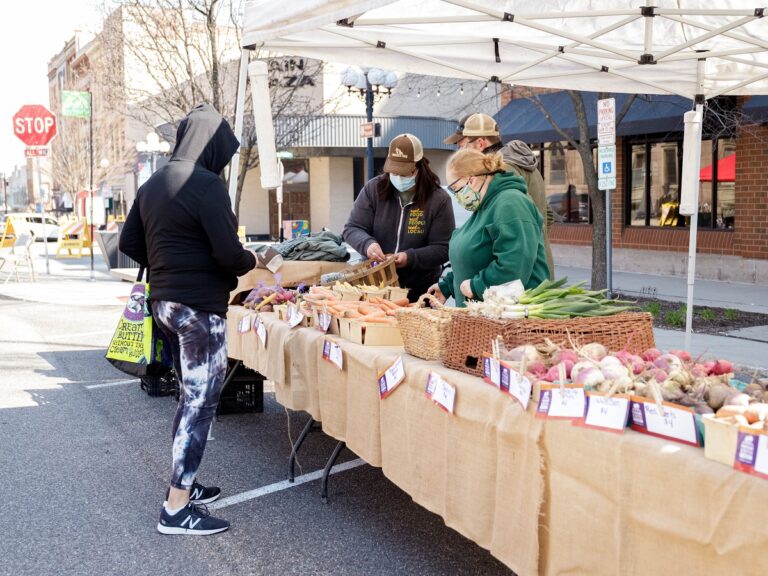CHAMPAIGN – If you’ve ever bought a scone or a jar of strawberry jam at your local farmers market, you’ve likely supported someone in the cottage food business.
A cottage food business is just what is sounds like: food prepared in a private home for sale to the public (bonus points for quaintness if that home is a literal cottage). And until recently, farmers markets were just about the only place in Illinois where cottage food could be sold.
But like it did for so many industries, the pandemic changed things.
“The pandemic was very disruptive to how we access food,” said Kelly Lay, of the Illinois Stewardship Alliance. “Both how businesses get to you, but also how you get to the businesses.”
As pandemic restrictions kept people at home, many turned to delivery services for groceries and meals. While plenty of restaurants were able to weather the shutdowns by turning to take-out, cottage food producers didn’t have that option.
Under laws at the time, most producers were only allowed to sell their products at farmers markets. “So when the farmers markets closed, that really had a big impact on cottage food businesses,” Lay said.
Lay is the local foods program manager for The Land Connection who also volunteers with Illinois Stewardship Alliance, a non-profit organization that promotes local food systems. Beginning in 2021, Lay spearheaded a successful effort to reform cottage food law in the state. The Home-to-Market act introduced changes that create a far less restrictive framework for producers.
“It’s huge,” Lay said of the reform. Instead of just farmers markets, now “anywhere that a cottage food business owner can get in front of you, they can sell to you,” she said. The change means that licensed producers can now sell directly to consumers out of their own homes, at fairs and festivals, and in roadside stands. And the new law allows for in-state shipping and deliveries.
The legislation also brought changes to what kind of products can be sold by a cottage food business. Under the previous law, only items considered to be “non-hazardous” like jams, preserves, and baked goods were allowed. The list of allowed items has now expanded to include things like kimchi, pickles, and buttercream frosting.
Yes, beloved buttercream frosting was previously verboten because of restrictions around dairy. And while some heath departments allowed for other options like royal icing, many wouldn’t allow for any frosting at all.
That prohibition made it tough for bakers, so Lay began working with health departments to reassess the potential for marketing frosting safely. “It’s not really a high risk food,” Lay said. “There’s so much sugar in it that it really doesn’t grow things. And that’s pretty well established,” she said.
The new law also creates more freedom for farmers to create value-added products, allowing for agricultural products to be transformed into salable, shelf-stable items.
The change means that a farm with leftover tomatoes can turn them into a marinara sauce to be jarred and sold alongside produce. Fruits can be turned into jams, peppers into salsa, and so on. The changes mean less waste and greater profits for small farms.
And Lay sees that as an important part of empowering both small businesses and rural communities.
Lay is an alderman for the city of Le Roy, a town of 3,500 residents surrounded by agricultural land. “We’re never going to be the city that attracts Amazon, or these big, like, white whales of economic development,” Lay said. “But what we do have are really amazing businesses that we can grow directly from our own people.”
Brick and mortar businesses involve big investments of both time and money. And restaurants are a particularly risky venture with high failure rates. Cottage food allows people to start a business with very little capital and to test the market for a future venture.
“It’s difficult for rural people, and people from disadvantaged communities, to take out those giant loans and to leverage everything into a dream like that. Cottage food lets you build your business from (the) ground up,” Lay said, pointing out that it’s possible to start a business using just the contents of your kitchen cabinets.
Lay said the changes to the cottage food law help to restore a sense of agency to rural communities, allowing people to generate revenue through the things they do best. “Everybody has to cook and eat in order to support themselves. “It’s crazy to me that it was illegal to do that – to do things that aren’t really that risky – that help you to financially support yourself and to support your community. And so this just really made a lot of sense.”
This story has been updated to clarify Kelly Lay’s position. She works for The Land Connection and has volunteered with the Illinois Stewardship Alliance.

